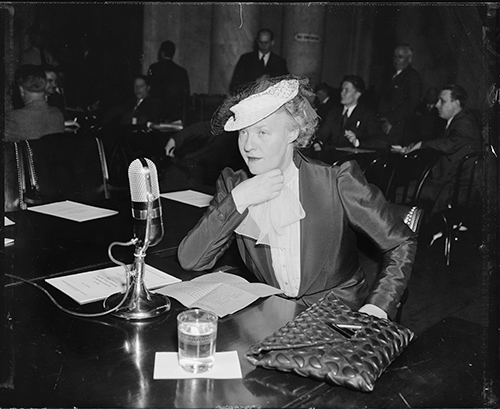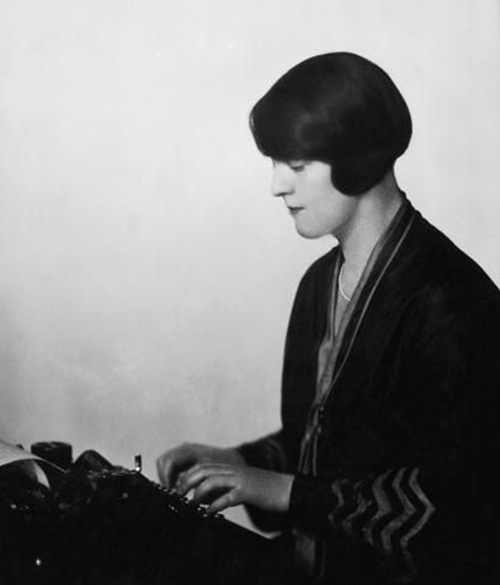Dorothy Thompson: The Real Woman of the Year
Nobody had to tell Americans in 1942 who the “Woman of the Year” really was. The main character in that movie, played by Katherine Hepburn, was a star reporter known for her determination, independence, and an immense knowledge of world affairs. Who else could it be but Dorothy Thompson?
Well before the war started, Ms. Thompson had built an international reputation out of hard work and a readiness to go to any story. One evening in 1926, for example, as she entered the Vienna opera house, she overheard someone talking about a coup d’état in Poland. Telephoning an associate, she learned there was truth to the rumor. She instantly left the theater, grabbed a suitcase of clothes, borrowed $500 cash from her friend Sigmund Freud, and boarded the last train to Warsaw. When the train was stopped 50 miles outside the city, Ms. Thompson and another correspondent flagged down an automobile, which took them within five miles of the city. From there, she continued on in darkness, dragging herself and her suitcase across muddy fields to avoid militia patrols. Arriving in the city, she was refused entry to her hotel and so headed to the American Embassy, stepping across dead bodies in the streets. After writing her story, she was told that all telegraph offices had been closed by the government. She immediately hired another car and drove far out into the country. She eventually found a telegraph station that hadn’t heard the order to shut down, from which she filed her story.

This sort of determination earned her a posting to Berlin in 1927, from where she watched Adolf Hitler’s rise from beer-hall demagogue to chancellor of Germany. In 1933, she wrote an article for the Post that analyzed how Hitler won a free election to become head of state. Much of his success, she stated, was his blatant appeal to “fear, hatred, envy and above all, ignorance.”
This much was obvious after the war, but it was still rare in the 1930s when many people were undecided about Hitler. Some saw him as a viable leader for his country, a man who could restore stability to Germany and oppose communism. Ms. Thompson wasn’t buying any of this wishful thinking. In her reporting of the Nazis’ assumption of power, she proved to be one of the very few who saw what was coming.
The German people have not had Mr. Hitler thrust upon them. He recommended himself to them and they bought him. More than 50 per cent of all Germans politically minded enough to exercise the right of suffrage—and nearly 89 percent of them went to the polls—deliberately gave away all their civil rights, all their chances of popular control, all their opportunities for representation. The German people went over to autocracy in March, 1933, in a body, burning all their bridges behind them.
That the vote came as a shock to most English and Americans is due to a couple of illusions fondly and incurably cherished by people whose tradition is largely Anglo-Saxon. One is the illusion that all peoples love liberty, and that political liberty and some form of representative government are indivisible. The other is that peoples are less aggressive than their rulers. For, essentially, in 1933,the German people voted to fight; to fight the war all over again if need be.
In a few days Hitler and his private army changed the whole form of political life in Germany.
Storm troops of Hitler were in possession of the streets. And in the days following the election, the streets of every municipality presented in a curious aspect. Germany had suddenly got into uniform. A strange deadness seemed to come over commercial life, but in the streets a mass moved constantly—a marching mass, with banners, with bands and with uniforms.
No whisper leaked out in the Berlin press of what was happening under the Third Reich. Hitler, still speaking night after night, talked of brotherly love and German unity to cheering masses. But his adjutant, Goering, master of Prussia’s police, made no secret of the government’s intention to exterminate everyone who showed hostility to the regime. “ I waste no sympathy over the eighty or hundred thousand traitors under arrest,” he said in a speech—and the public learned for the first time the possible extent of the government’s roundup.

Many journalists continued reporting from Germany throughout the 1930s, but only because they carefully avoided reporting anything that would offend Hitler. Ms. Thompson wasn’t interested in tact or compromise. So, in 1934, the Gestapo marched her out of the country, making her the first reporter deported from Germany.
It was hardly the end of her career. Back in the U.S., she continued reporting and began broadcasting her analysis of the news. By 1942, Time magazine reported that she was one of the most admired woman in the country, second only to Eleanor Roosevelt.
Ms. Thompson would have turned 118 years old this Saturday, and while you and I might think that an advanced age, she didn’t. She told a Post writer in 1940:
She feels cramped by the limitations of an ordinary lifetime and often speculates on how nice it would be to live two or three hundred years. To someone who once asked her what epitaph she would like, she replied, “Died of extreme old age.”
Next: “What a Woman!“